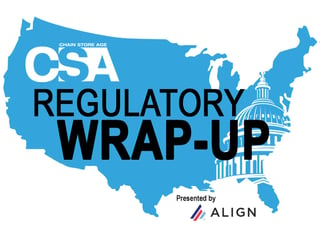Regulatory Wrap-up: Insider’s guide to retail-related legislative developments - April 16
Wages
Maryland: Legislation to raise the state’s minimum wage to $15/hr failed to pass prior to the session adjournment. Similar legislation will likely be revisited next legislative session.
Massachusetts: Governor Baker registered his preference for the legislature to address both the minimum wage increase and the establishment of a paid leave program as opposed to leaving the issue to the ballot. The legislature could choose to approve a more moderate minimum wage increase and paid leave requirement; however, since both issues are already certified for the ballot, advocates would have to agree to support legislation in order for the ballot initiative to be avoided, which remains unlikely at this stage.
New Jersey: The legislature has not yet passed the minimum wage increase bill that has long been expected since Governor Murphy’s recent election. The legislature has passed several pieces of labor-related legislation but the wage bill is still under negotiation and will not have an opportunity to advance until June at the earliest.
Rhode Island: A house committee recommended that legislation to increase the minimum wage to $15/hr by 2022 be held for further study, slowing down and potentially stalling the bill.
St Paul, MN: Mayor Carter told members of the Midway Chamber of Commerce that he fully expects the city to approve a $15/hr minimum wage by the end of the year. Debate continues on issues such as the size of businesses that would be impacted, inclusion of a training wage or the length of the phase-in period. At the event, the mayor also registered his opposition to incorporating a tipped wage into the expected law (Minnesota is one of seven states with no tip credit).
Washington D.C.: In an interview with Politico, the Restaurant Workers of America, a group of servers and bartenders, stated their opposition to the June 19 ballot measure that would gradually eliminate the city’s minimum hourly wage for tipped workers. The organization’s leadership also expressed concerns over language in the recently-passed funding bill that repealed the Obama-era rule banning tip pools. The group has been effective in some states in advancing the argument that the elimination of tipped wages actually decreases the take home pay of servers.
Paid Leave
Hawaii: Two bills that establish paid leave, one mandating that certain businesses offer leave and another that would set up a state-run program by 2023 have stalled. It remains to be seen whether or not the issues will be ironed out before the legislature adjourns.
Maryland: The legislature approved an income tax credit of up to $500 per qualified employee for businesses with fewer than fifteen employees that offer paid leave. The legislation is intended to soften the impact of the paid leave law on small businesses and is expected to be signed by the governor.
New Jersey: The senate approved paid leave legislation, sending the bill to the governor’s desk for his expected approval. The business community was successful in securing a number of important provisions, including a preemption on local leave ordinances, blackout dates as set by employers, an exemption for seasonal workers and a reduction in the maximum hours of leave (72 to 40 hours). The new law will go into effect 180 days following the governor’s approval.
Wage Theft
Labor Department: The Wage and Hour Division released a field assistance bulletin clarifying the agency’s authority to enforce new tip credit rules as included in the recent government funding law. The bulletin confirms that businesses who pay the federal minimum wage of $7.25/hr may allow employees to participate in tip pools. The bulletin also confirms that the agency will enforce provisions that prevent employers from keeping any portion of the pooled tips.
Labor Department: The Labor Department released additional details of its new nationwide pilot program, the Payroll Audit Independent Determination (PAID) program, which is intended to facilitate resolution of potential overtime and minimum wage violations. The agency’s new web portal addresses many of the initial questions related to the program. Meanwhile, a coalition of state attorneys general sent a letter to Labor Secretary Acosta stating that the federal program would not exempt employers from state laws and they intend to prosecute any violators.
Equal Pay
Federal Court: The 9th Circuit Court of Appeals reversed a lower court decision and found that prior salary alone, or in combination with other factors, does not justify a wage differential between employees of different genders. The 9th Circuit has jurisdiction over Alaska, Arizona, California, Hawaii, Idaho, Montana, Nevada, Oregon and Washington.
Scheduling
Illinois: A house committee held a hearing on the proposed “Fair Scheduling Act.” The bill would require employers to post schedules 72 hours in advance and would mandate premium pay when shifts are adjusted within that window. One of the more concerning aspects of the bill is the allowance for private right of actions as an enforcement mechanism. The bill also contains no preemption of local mandates. It is unclear at this stage whether or not the bill has the support to pass both chambers. The governor would likely oppose it, setting up a potential veto override.
Labor Policy
NLRB : This week the U.S. Senate confirmed John Ring to fill the NLRB’s only remaining vacancy, restoring the five-member Board to full strength. Reports also indicate that Ring will chair the Board. With a Republican majority in place, many expect the Board to continue overturning Obama-era precedents and pursue a pro-employer agenda on the rulemaking front.
Data Privacy
Arizona: A bill expanding the existing law governing data breaches was signed into law by the governor. The bill, which is supported by the attorney general, strengthens notification requirements and expands the definition of personal information to include fingerprints, electronic signatures and email addresses. The bill was amended to ensure that a breach must still result in "substantial economic loss" to trigger notification requirements.






